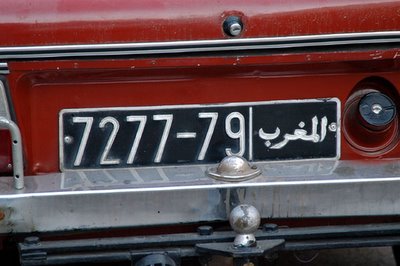Casablanca 2

Taxi Driver
I appreciated the taxi guy who picked me up at the airport in Casa. He knew his way around town and got me where I wanted to go quickly and at a fair price.
He did such a good job I ended up asking him to drive me around when I needed a lift during the rest of my stay.
Taxi drivers in the developing world love steady work from Americans or Europeans since western travelers usually go longer distances than the locals. The tips are a lot better too.
Getting in touch with him was no problem. More and more of the working poor in the third world own or share cell phones.
Cell phones are a mixed blessing in the states. I don’t own one because at this stage in my life I’m not sure I want to be more available than I am. People with cell phones regularly pitch their convos at “outside voice” volume when they’re actually inside, and studies show that people who drive while talking on cell phones are the most dangerous people on the road—you’re better off driving among drunks than among serial conversationalists.
Among the truly poor, though, cell phones may be the best thing since domesticated agriculture.
In the past only people in the "developed" world could count on efficient communication. Cell phones have opened up easy and relatively affordable communication for even the poorest of the world's poor. I can’t think of many technologies that have done more to improve the economic well being of “the least.”
Anyway, this guy was good. He drove pretty carefully and knew Casablanca inside and out.
Westerners tend to trust implicitly that taxi drivers will know how to get them from A to B. That’s not always the case in the "developing" world.
 Mr. Toad's Wild Ride?
Mr. Toad's Wild Ride?If you’re traveling in a third world metro area filled with lots of poor people from the rural boonies, you can sometimes get taxi drivers who know as little about the city as you do and who often know even less about surviving a drive alive.
The whole thing can be Mr. Toad’s Wild Ride. Traffic lights and lanes are merely vague suggestions. Video game speed and Star Wars-like weaving in and out of oncoming metal objects are the unique disciplines of the third world taxi warrior. Working seat belts? Surely you jest.
All that macho bravado sometimes contributes very little to getting you where you want to go. I’ve circled cities with taxi guys who didn’t know one end of town from the other. On a couple of occasions I’ve ended up paying them to drop me off so I could just make a go of it on foot with my compass and map.
My guy pimped his ride too.
He had a makeshift hood ornament on the front of his beater that I couldn’t quite make out. It looked sort of like an elongated blob of hardened mercury that tapered toward a point. I’m sure he meant it to suggest speed or aerodynamics or male virility but it actually suggested a bad welding job by cousin Aziz.
The rest of the outside of the cab was dull and drab. Taxis—and especially buses--in other parts of the world often get shiny with heavy chrome and lots of bright paint and religious sayings. Islamic taxis tend to have less curb appeal.
But inside the cab the situation was pretty different.
He draped cheap and bright red velvet with gold tassles over most of the threadbare and thrashed interior. Up front he had a bunch of colored Islamic worry beads hanging from the rear view mirror and lots of blue Islamic script calligraphied onto any available surface. Finally, he finished it off with some woven geometric trinkets glued in patterns onto the ceiling. I know it sounds like a crazy mishmash but it really looked pretty good. Unfortunately, he wouldn’t let me take a picture of it.
I’m surprised nobody has done a book or a museum show on transportation art in the developing world. A lot of it is really excellent “naïve art” and a little of it borders on fine art. Some of you more egalitarian souls probably bristle at that distinction, but you know what I mean. If you’re an art investor consider yourself tipped.
 Chicken Bus Guatemala
Chicken Bus GuatemalaI was sad to say goodbye to him when I left town. I guess knowledgeable, careful, and creative people are a blessing anywhere, but never more so than from the vantage point of the backseat of a third world taxi.


2 Comments:
I have relatively limited experience but I agree with everything you say about taximen (are there countries where women drive taxis? I've never seen a female driver, even in the States). The availability is especially great. I was able to call up a guy at 4:30 AM in a villiage in a fairly remote section of India. I had run out of cash earlier and ended up paying that driver with a combination of a few rupees and a $5 bill (he had no idea how much it was worth). But I promised him that I'd be able to get more rupees later, and he had no problem with getting woken up in the middle of the night to give me a 1.5 hour ride out of town.
Ya, Dean's a maniac. Gotta be from growing up in the third world. The funny thing about the honking is that in a lot of places they honk to let you know they see you, which means everybody is honking all the time. It's pretty unnerving the first couple of times you experience it--sometimes I actually where ear plugs walking around certain cities!
Post a Comment
<< Home